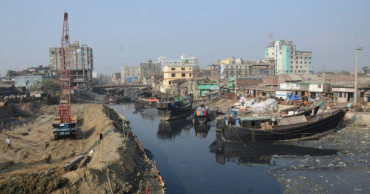NRCC
WASA key reason behind pollution of Dhaka’s rivers, NRCC chairman says
Although there are directives from the country’s highest court to save rivers, authorities concerned have failed miserably to stop pollution and encroachment. Thus, rivers around Dhaka city are still being polluted.
In an interview with UNB, Dr Manjur Ahmed, chairman of National River Conservation Commission (NRCC), put a major share of the blame on Dhaka WASA.
Dhaka WASA’s failure to construct enough sewerage lines has created a disastrous situation. Factories in and around Dhaka dispose of waste into the rivers surrounding the city. Combination of household and industrial wastes has turned rivers like Buriganga and Shitalakhya “ecologically dead”.
Read:Buriganga Pollution: Contempt rule issued against Wasa MD
“All the human waste produced in Dhaka city goes into the four rivers surrounding it. This happens due to Dhaka WASA’s failure to manage the waste. Excrement and rainwater go to the rivers through the same pipe. It was WASA’s duty to set up separate pipes for proper flow of the wastes. They didn’t do so, and as a result rivers are being polluted fast,” said Manjur.
The NRCC chairman added that although much of the grabbed lands by the rivers have been recovered, pollution couldn’t be stopped as those responsible were not brought under the law.
“At least four crore people live in and around Dhaka city but there isn’t a single river or waterbody where people can bathe. Population density, unmanageable development, withdrawal of water in the upstream and climate change are affecting the country’s rivers. As an organization working to conserve rivers, NRCC is acutely aware of these problems,” said Manjur.
Read:Dhaka rivers get polluted, WASA moves to supply water from Meghna
About NRCC, Manjur said that the role of his organization is to identify the problems and provide recommendations to the concerned authorities.
“NRCC is a relatively new organization. Some recommendations made by us have already been implemented and others are pending with the authorities. So far, we’ve identified 57,000 illegal encroachers and evicted 14,000 of them through the help of the district administrations and Bangladesh Inland Water Transport Authority (BIWTA),” said Manjur.
On the demarcation of river boundaries, the NRCC chairman said that it’s a tough task.
Read Tajul briefs JS on Wasa, city corporations' projects to serve capital
“The boundaries of Buriganga, Turag and Balu rivers have already been demarcated. I hope that the rest of the rivers will also be demarcated gradually,” said Manjur.
On the master plan that NRCC was preparing, Manjur said that it is yet to be completed.
“The process of preparing the master plan was interrupted due to the Covid-19 pandemic. I hope that we’ll be able to complete the master plan within a short time,” the NRCC chairman said.
Read LGRD Minister directs WASA to fix water price in capital rationally
During the interview, he informed UNB that his organization aims to put an end to pollution of the rivers surrounding Dhaka within March 17, 2023, which is the birth anniversary of Father of the Nation Bangabandhu Sheikh Mujibur Rahman.
“We’ll provide directives to all the government and private establishments in Dhaka and adjacent areas to stop polluting the rivers surrounding the city very soon. Legal steps will be taken if anyone breaches the rules and fails to comply with the directives,” Manjur said.
3 years ago
Over 18,000 of 60,000 illegal river grabbers evicted: NRCC Chairman
More than 18,000 out of 60,000 illegal river grabbers across the country have already been evicted in the course of several drives.
National River Conservation Commission (NRCC) Chairman ASM Ali Kabir revealed the numbers while addressing a discussion meeting on Saturday held at Jatiya Press Club (JPC) in the city.
The NRCC chairman said that it has prepared a list of 60,000 illegal river grabbers. Of them, more than 18,000 illegal occupants were evicted conducting several drives.
He said that though illegal grabbers are very influential, the NRCC is also very strong. "Those who are still occupying the river lands would be evicted soon. At the same time, legal actions would also be taken against them if they don’t return the lands," Ali Kabir said.
Responding to the demand, the NRCC Chairman opined that the government should constitute a separate ‘River and Waterbody Ministry’ to save the country’s rivers for the betterment of people's livelihood and protecting the ecosystem conserving water in the rivers.
Bangladesh Nodi Bachao Andolon (Save the Rivers Movement of Bangladesh) organized the meeting to mark World Rivers Day, 2021. The day is observed every year on the fourth Sunday of September.
Organisation’s Central President Prof Anwar Sadat chaired the meeting and joint secretary Burhanuddin Auronno moderated the event while NRCC member Kamrun Nahar Ahmed, General Secretary Anwar Hossain, vice presidents SM Shafiqul Islam Kanu, Majeda Shawkat, Lutfor Rahman, Khandker Amirul Haq, Monir Munna, joint secretaries Kalimullah Iqbal, Basir Uddin, Amirul Islam, Treasurer Anwar Hossain and Shamim Ahmed Dewan, Dhaka City Unit General Secretary Mohosinul Karim and vice president Mizanur Rahman also spoke, among others.
NRCC member Kamrun Nahar Ahmed said the rivers can’t be occupied in future in the name of development. All illegal structures will be evicted from river embankments. To ensure punishment of the grabbers and polluters, steps have been taken to amend the existing law keeping the offenses as criminal offense, she added.
The speakers also demanded constitution of a tribunal for punishing the grabbers and polluters, recovering the rivers and canals from the illegal occupants and preventing misuse of public funds allocated for saving the rivers.
4 years ago

.jpg)
